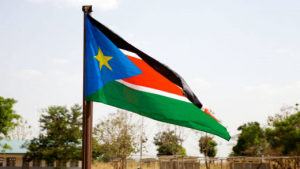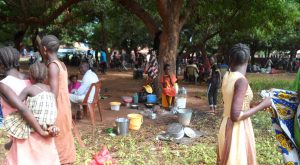
By Ann Marie Foley - 20 July, 2016

Six Franciscan Missionary Sisters for Africa (FMSA) have remained on in South Sudan despite the danger as fighting has broken out.
“The situation in Wau remains tense,” said Sr Rosemary Oduol. “The Internally Displaced People (IDPs) are gathered around the Catholic cathedral compounds including our own gate. The inside of our own sitting room and chapel are currently being used to store food and hygiene items.”
Misean Cara, the umbrella group for Irish Missionaries, reported that the sisters in Wau and have been distributing food including sorghum (a type of grain) from Emergency Funding received for the hospital and schools.
The sisters who remained include Sr Rosemary Oduol who is Matron of the St Daniel Comboni Catholic Hospital; Sr. Perpetual Nagama Shaba a nurse; Sr. Leonidah Mokua a pharmacist; Sr. Maria Goretti Namono and Sr. Ann Wandia teachers; and Sr. Susan Aseu, finance department.
“Within our compound here we are holding over 4,000 households of registered IDPs with an average of 4 – 6 family members so we estimate that the compound is holding over 16,000 – 24,000 people. Everywhere is full of people. You cannot move,” says Sr Rosemary.
The government has called on IDPs to return to their homes but they are afraid as soldiers are patrolling the area, and there are often attacks on civilians.

The FMSA sisters who work in the St. Daniel Comboni Catholic Hospital have set up a mobile clinic to see sick patients amongst the IDPs. Over 600 people were treated for malaria, coughing, diarrhoea, gunshots, and injuries as the result of the violence. 19 people were shot dead in residential areas, and have been buried in the cathedral compounds.
The atmosphere in the area is tense, and the Catholic Church is helping coordinating activities with other NGOs.
At the end of June violence erupted in Wau in the North-West and according to the UN more than 70,000 people have been displaced, and dozens have been killed in the unprecedented violence. This precarious situation throws into doubt the peace deal struck five years ago which saw South Sudan become an independent nation.
Loreto sisters who are present in in Rumbek South Sudan have also opted to stay with the 700 schoolgirls who are pupils of their primary and secondary schools there. Among them are two Irish nuns Sisters Maria Suelta and Colette Deasy.

Loreto Sister Orla Treacy talks with students in Loreto Primary School,Rumbek, South Sudan
Another Irish colleague of theirs is the principal of the school, Sister Orla Treacy, who was in Ireland when violence broke out. She is determined to return to Rumbek, where she has been working for the last ten years.
In March Sr Orla spoke to Fergal McCarthy in South Sudan for a Misean Cara commissioned documentary South Sudan 101: Education in the World’s Youngest Country broadcast on Newstalk FM.
The Loreto Secondary School is is the only school of its kind in the region. As the Government has a policy of employing at least 20% of women, the school aims to prepare girls for such leadership roles.
There is also a Primary School which was opened four years ago and now has 10 classes with just under 500 students – boys and girls from the surrounding communities. However conflict has continued in South and forces that fought side by side during the war of independence now fight each other.
“I suppose independence was a huge high, and we had to come down. Unfortunately we’ve been coming down ever since. People had that dream that life was going to be better may be that there was going to be an instant fix to our problems. That we would have better roads and infrastructure, jobs, money, and security,” said Sr Orla.
She explained that no one could have expected South Sudan to change us from a fighting nation to a “working democracy” overnight.